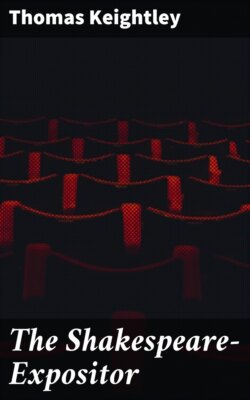Читать книгу The Shakespeare-Expositor - Thomas Keightley - Страница 54
На сайте Литреса книга снята с продажи.
9.
ОглавлениеTransposition.—Of all modes of restoring the melody, and at times the sense, of verses this is perhaps the most legitimate and the most certain. I have therefore had recourse to it without scruple; and it will be seen that in my Edition and in this volume I have thus restored the sense or the melody of about sixty lines, of which not quite a fourth had attracted the attention of preceding editors. In my Life of Milton (p. 286) will be found a very curious instance of transposition and omission combined in the poet's own reprint of Comus, neither of which he notices, though he made two corrections in one of the lines.
In Chaucer's Romaunt of the Rose, the transpositions in the latter part are so numerous that it was necessary to have recourse to the original poem for the proper arrangement; and I suspect that this source of error will be found in most languages. Mr. Brandreth, in his very curious and interesting edition of the Ilias, has made many transpositions, and they are well deserving of attention. His note on Il. i. 18, is "Verborum transpositio tutissimum remedium est, cum saltem, quoad grammaticam, ita dixisse potuerit poeta. Recitatores sæpe verba retinent, dum ordinem obliviscuntur." This most exactly accords with what we find in Shakespeare. I think also that many might be, as some have been, made in the poetic and prophetic books of the Old Testament—ex. gr.,
"Ye mountains of Gilboa, no dew nor no rain be upon you, and fields of offerings; for there" &c.—2 Sam. i. 21.
Now surely the royal poet must have written,
Ye mountains of Gilboa, and fields of offering!
No dew and no rain be upon you:
and it appears still more certain when we look at the original Hebrew.
A chief cause of errors of this kind seems to have been the addition, by the author, of one or more lines to a place which he had previously deemed complete, and this addition, having been made in the margin, was taken in by the printer in the wrong place; as such I regard the transposition in M. N. D. ii. 1. Another cause was the omission of something by a transcriber, who, when he detected his error, wrote what he had left out in the margin, and the next transcriber or the printer carelessly inserted it in the wrong place. Of this we have very striking instances in the Chorus to Hen. V. ii., 2 Hen. VI. iii. 1, and Rom. & Jul. iii. 3. As in these cases, entire lines or even couplets get out of place, sometimes parts of lines (King John, iii. 3, Rich. II. v. 3), at other times single words. Thus adjectives change places (Temp. i. 1. iv. 1), and substantives do the same (All's Well, ii. 3, M. N. D. ii. 1, L. L. L. iv. 3). The following is a notable instance. In Massinger's Maid of Honour (i. 1), a play of which the proofs were probably read by the poet himself, we read, "A gentleman and yet no lord," where the context shows that the very opposite is meant. Gifford saw this, but he did not see the cause, namely, that a and no had changed places in the printer's mind.
I have remarked several errors of this kind in Chaucer, in whom, in fact, they are most numerous—ex. gr.,
And eke in his hert had compassioun.
And in his hert eke had compassioun.
And pitous and just and alway y-liche.
And just and pitous and alway y-liche.
That it was a blissful noise to here.
That it a blissful noise was to here.
In the Faerie Queene, we have
Was like enchantment, that through both his eyes
And both his ears, did steal his heart away.
vi. 2. 3.
Here, as the riming line ends in appears, we must transpose "eyes" and "ears." Again, in all editions of Parnell's poems, from the first (edited by Pope), we read in the Hermit,
Then with the sun a rising journey went,
where both the context and common sense show that "rising" properly belongs to "sun." The original printer, however, joined it with "journey," and he has been, of course, duteously followed by his successors, while editors never seem to have discerned the incongruity.
In the edition of Akenside above mentioned, I met with
Of triangle or circle, cube or cone,
where it is quite plain that the two first substantives had changed places in the printer's mind.
Surely Wordsworth did not write
I did not hunt after nor greatly prize.
Prelude, ed. 1858.
In a proof-sheet of my Edition, I found
And leave your brother speed to gos elsewhere.
3 Hen. VI. iv. 1.
In Troilus and Cressida, v. 2, there is a passage to which transposition, and it alone, gives sense. It is difficult to see how the printer could have made such a jumble; and yet it is manifest that he must have done so. There is, however, as I have shown in my note on the place, just such another in the play of The Two Noble Kinsmen, which the editors have made no attempt at correcting. In the following passage of Chaucer,
Tooke my horse and forthe I went,
Oute of my chaumbre; I never stent.
Book of the Duchesse.
I would read
Oute of my chaumbre forthe I went,
And tooke my hors; I never stent.
In the same poet's Romaunt of the Rose, we have the following passage, unnoticed by any editor,
Thine armys shalt thou sprede abrode
As man in warre were forweriede,
where in the first line we should read "abrode sprede," and in the second reject "were" as an addition of the copyist. An exactly similar transposition occurs in a later part of that poem.
